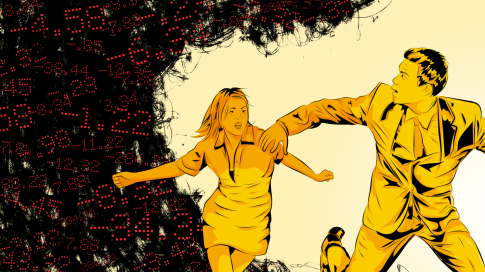Why the stock market is freaking out

Extreme fear is once again sending Wall Street into chaos.
By Matt Egan
Extreme fear is once again sending Wall Street into chaos. Investors are debating whether the longest bull market in American history is nearing an end or just taking a breather.
From "Tariff Man" tweets and inverting yield curves to the arrest of a Chinese executive, there is no shortage of headlines keeping investors awake at night.
After booking its best week since 2011, the S&P 500 plunged 3.2% Tuesday and tumbled again Thursday before staging a massive recovery. No matter the catalyst, the overarching fear is over just how long the economy has until the next recession strikes. Months? Quarters? Years?
"Markets are fully convinced we are in the last stages of an economic cycle," Nicholas Colas, co-founder of DataTrek Research, wrote in a note to clients. "Traders are feverishly looking for the dry tinder that will turn a simple short circuit into a full-blown conflagration."
Signs of worry abound. The Fear & Greed Index, a CNN Business gauge of market sentiment, is flashing "extreme fear." Germany's stock market is flirting with a bear market. Oil prices are already there. The VIX volatility index (VIX) has spiked 22% this week. And the S&P 500 is on track for its worst quarter in seven years.
"We're at a very confusing point for the economy," said Kristina Hooper, global market strategist at Invesco. "It's not as predictable as it was last year when growth seemed a lot more potent."
Enter Tariff Man
Hopes of a truce in the US-China trade war have faded into worries of an escalation. Investors only briefly celebrated the ceasefire reached by President Donald Trump and Chinese President Xi Jinping at last week's G-20 summit.
Trump fueled doubt about the sustainability of trade peace on Tuesday when he called himself a "Tariff Man" in a tweet.
The Dow plummeted 799 points on Tuesday and analysts pointed to Trump's tweet as one of the catalysts.
"The president's characterization of himself as 'Tariff Man' is juvenile and unpresidential," Dennis Gartman, editor and publisher of The Gartman Letter, wrote on Thursday. "We can only shake our heads in wonder and dismay."
The president also suggested tariffs will "MAKE AMERICA RICH AGAIN," despite the fact that these levies are paid by American companies and consumers.
"The payment comes from my pocket and yours," David Kotok, chairman and chief investment officer at Cumberland Advisors, wrote to clients on Thursday. "In a trade war the guns are pointed inward. No one wins."
Is the trade war getting better or worse?
Stocks tumbled again on Thursday after the arrest in Canada of Huawei CFO Meng Wanzhou, though they rallied back later in the day. Meng is the daughter of one of founders of Huawei, a company that has been likened to the Apple of China. The arrest, at the request of the United States, opens up a new avenue in the trade war that investors had been hoping for relief from.
"This arrest suggests that as opposed to getting better, things are getting worse," said Joe Quinlan, chief market strategist at Bank of America's US Trust.
The tit-for-tat tariffs with China threaten to overshadow the tax cuts and deregulation that had been helping speed up economic growth. Not only do tariffs lift costs, they disrupt supply chains and force businesses to delay investment decisions.
Trade sensitive stocks like Boeing (BA) and Caterpillar (CAT) have tumbled this week.
Concerns about the trade war prompted the IMF to recently downgrade its 2019 economic growth forecasts for both China and the United States.
"We seem to be stuck in a cul-de-sac that we just can't get out of when it comes to the trade standoff with China," said Quinlan.
Recession jitters
Meanwhile, one of Wall Street's favorite recession indicators is suddenly flashing yellow. The gap between two-year and 10-year Treasury yields has narrowed to levels unseen since just before the Great Recession.
Investors are getting nervous that the yield curve will invert, meaning short-term rates are higher than long-term ones. That has in the past been a reliable prognosticator of recessions.
At a minimum, the flattening yield curve reflects concerns over slowing growth and a Federal Reserve that could be raising borrowing costs faster than the economy can handle.
And the phenomenon makes it harder for banks to make money. The SPDR S&P Regional Banking ETF (KRE) has plunged nearly 6% this week. Big banks like Citigroup (C) and Bank of America (BAC) are down even more.
Hooper predicted the yield curve will widen soon because the Federal Reserve is likely to dial back its interest rate hikes for next year. Such an outcome could ease fears that the Fed is walking into a mistake.
Late-cycle behavior
Even though investors are watching for the next recession, the underlying fundamentals of the economy look solid, if not strong.
Friday's jobs report showed that the US unemployment rate in November remained at just 3.7% and wages grew at 3.1%. However, only 155,000 jobs were created last month, missing expectations for 200,000.
The Atlanta Federal Reserve's forecasting model is calling for fourth-quarter GDP growth of 2.7%. That's down a touch from its early November prediction of 3% growth, but still a far cry from a downturn.
"It's hard to pencil in a recession anytime soon," said Quinlan. "The US consumer is at the core of the economy -- and that core is pretty rock solid right now."
Rather than an imminent downturn, investors seem to be preparing for a more treacherous horizon. Economic and profit growth are projected to slow in 2019 and some economists have warned of a recession in 2020.
In the meantime, investors should brace for more volatility. Turbulence is par for the course in late-cycle markets./cnn




 del.icio.us
del.icio.us Digg
Digg

Post your comment